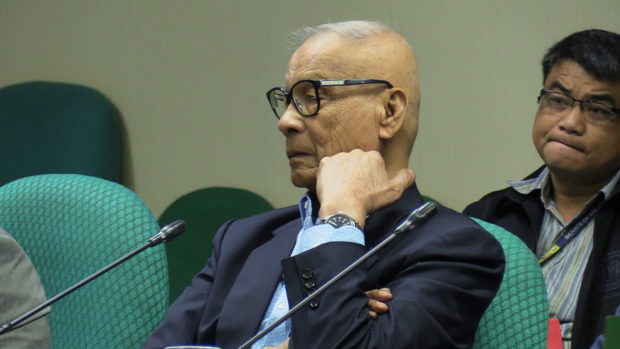Ex gov’t officials push anti-political dynasty law before 2025 polls

Former Sen. Rodolfo Biazon was among those who signed a statement pushing for a law prohibiting political dynasties. (File photo by CATHY MIRANDA / INQUIRER.net)
MANILA, Philippines — A group of retired government officials, including police and military generals, have called on the government to finally pass a law prohibiting political dynasties, saying that they breed corruption, which worsens poverty and injustice in the country.
In a statement on Tuesday, the Advocates for National Interest, whose members are composed of senior government officials, said that checks and balances in the government should be tightened in order to revitalize the economy. This could be done by the proper use of public funds “so that they are not reduced, not squandered and not wasted… by the corrupt.”
“[T]o institutionalize good governance by elected and appointed officials, the constitutional provision on removing political dynasties be legislated as soon as possible, and that electoral reforms to do away with money politics be initiated and implemented in due time, before the next national and local elections in May 2025,” the group said.
Among the 20 former government officials who signed the statement were former Armed Forces of the Philippines chief and former Sen. Rodolfo Biazon, former AFP chiefs Generals Emmanuel Bautista, Victor Ibrado, and Alexander Yano; as well as Eliseo Rio, former secretary of the Department of Information and Communications.
According to them, many lowly government workers have pending cases for stealing or misappropriating government funds, but there were few convictions for well-connected individuals or groups.
Article continues after this advertisementArticle II, Section 26 of the 1987 Constitution provides that the State shall guarantee equal access to opportunities for public service and prohibit political dynasties as may be defined by law. However, after almost four decades, all administrations failed to enact an enabling law to prohibit their existence.
Article continues after this advertisementFutile attempts since 1987
Numerous attempts as early as the 8th Congress in 1987 attempted to introduce an antipolitical dynasty law to effect electoral and political reforms, but all have been for naught.
Studies attributed this to the fact that many members of Congress came from political clans themselves.
A 2019 study by the Ateneo de Manila University’s School of Government found that there were high levels of poverty and inequalities in areas where political dynasties thrive, especially in the provinces.
Citing data during the 2019 elections, 80 percent of governors, 67 percent of House representatives, and 53 percent of mayors came from “fat” political dynasties — or those when there are several members of a family holding government positions at the same time.
Among the provinces, Maguindanao had the most officials belonging to a dynasty, eating up about 50.54 percent of political posts.
No lawmaker in the House of Representatives has filed an antipolitical dynasty bill in the current 19th Congress. In the Senate, only Sen. Grace Poe filed Senate Bill No. 548 which aims to define and prohibit political dynasties.
The bill, however, languished at the committee level after its first reading in August 2022.